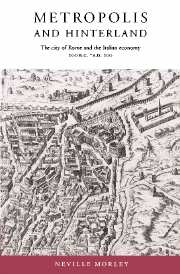Book contents
- Frontmatter
- Contents
- List of maps and figures
- Preface
- List of abbreviations
- Introduction: Rome and Italy
- 1 The metropolitan city in a pre-industrial economy
- 2 The demographic burden
- 3 A model of agricultural change
- 4 The transformation of the Roman suburbium
- 5 Agricultural development in central Italy
- 6 Exploiting the margins
- 7 Marketing and urbanisation
- Conclusion
- Bibliography
- Index
Conclusion
Published online by Cambridge University Press: 17 August 2009
- Frontmatter
- Contents
- List of maps and figures
- Preface
- List of abbreviations
- Introduction: Rome and Italy
- 1 The metropolitan city in a pre-industrial economy
- 2 The demographic burden
- 3 A model of agricultural change
- 4 The transformation of the Roman suburbium
- 5 Agricultural development in central Italy
- 6 Exploiting the margins
- 7 Marketing and urbanisation
- Conclusion
- Bibliography
- Index
Summary
It is no coincidence that Dickens never writes about agriculture and writes endlessly about food. He was a cockney, and London is the centre of the earth in rather the same sense that the belly is the centre of the body. It is a city of consumers …
(George Orwell, ‘Charles Dickens’)Whether or not Orwell believed that a body could survive without a digestive system, the implications of the simile are clear: it would be better off without one. London is inhabited by people who are ‘deeply civilised but not primarily useful’; it contributes nothing of any worth to the life of the rest of the country. The need to feed this belly is a heavy burden, a distraction from more important activities. What might human beings, or nations, not achieve if they were relieved of the necessity of devoting most of their days to filling the insatiable gut?
Such remarks are part of a long tradition of debate over the place of the city, and above all of the great metropolis, in the economy and society of the country that supports it. The Western city is the embodiment of modernism and modernisation, and praised or reviled as such. At the present time, the dominant image is the urban dystopia of films like Blade Runner. In the past, the city was seen both as the symbol of the brave new industrial civilisation and as one of the agents that brought it into being, overcoming the reactionary forces of feudalism and ignorance.
- Type
- Chapter
- Information
- Metropolis and HinterlandThe City of Rome and the Italian Economy, 200 BC–AD 200, pp. 184 - 185Publisher: Cambridge University PressPrint publication year: 1996

